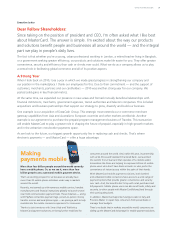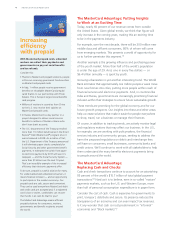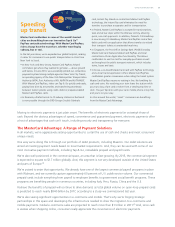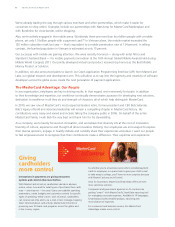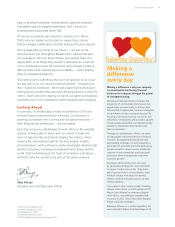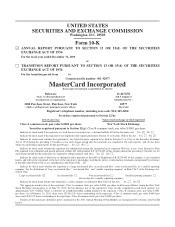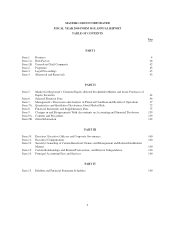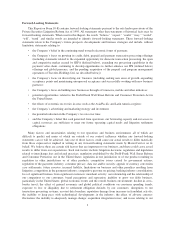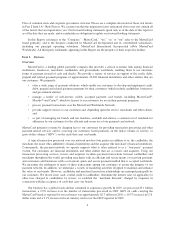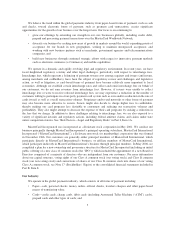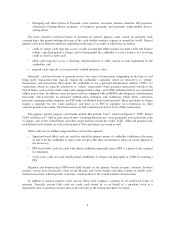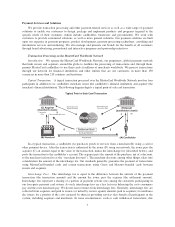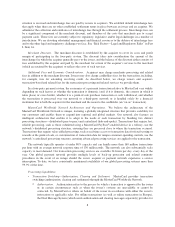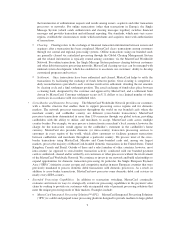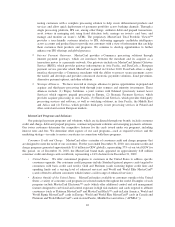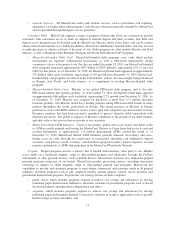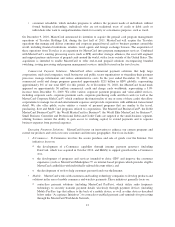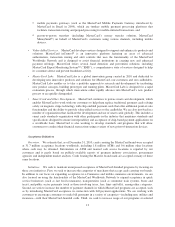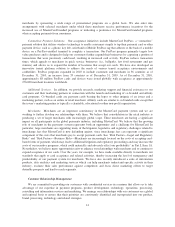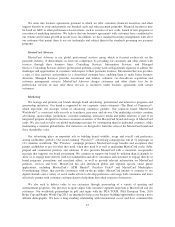MasterCard 2010 Annual Report Download - page 15
Download and view the complete annual report
Please find page 15 of the 2010 MasterCard annual report below. You can navigate through the pages in the report by either clicking on the pages listed below, or by using the keyword search tool below to find specific information within the annual report.We believe the trend within the global payments industry from paper-based forms of payment, such as cash
and checks, toward electronic forms of payment, such as payment card transactions, creates significant
opportunities for the growth of our business over the longer term. Our focus is on continuing to:
• grow our offerings by extending our strength in our core businesses globally, including credit, debit,
prepaid and processing payment transactions over the MasterCard Worldwide Network,
• diversify our business by seeking new areas of growth in markets around the world, expanding points of
acceptance for our brands in new geographies, seeking to maintain unsurpassed acceptance, and
working with new business partners such as merchants, government agencies and telecommunications
companies, and
• build new businesses through continued strategic efforts with respect to innovative payment methods
such as electronic commerce (e-Commerce) and mobile capabilities.
We operate in a dynamic and rapidly evolving legal and regulatory environment. In recent years, we have
faced heightened regulatory scrutiny and other legal challenges, particularly with respect to interchange fees.
Interchange fees, which represent a balancing of payment system costs among acquirers and issuers (and in turn,
among merchants and cardholders), have been the subject of regulatory review and challenges and legislative
action, as well as litigation, as card-based forms of payment have become relatively more important to local
economies. Although we establish certain interchange rates and collect and remit interchange fees on behalf of
our customers, we do not earn revenues from interchange fees. However, if issuers were unable to collect
interchange fees or were to receive reduced interchange fees, we may experience a reduction in the number of
customers willing to participate in a four-party payment card system such as ours and/or a reduction in the rate of
cards issued, as well as overall transaction volumes. Proprietary end-to-end networks or other forms of payment
may also become more attractive to issuers. Issuers might also decide to charge higher fees to cardholders,
thereby making our card programs less desirable to consumers and reducing our transaction volumes and
profitability. They also might attempt to decrease the expense of their card programs by seeking a reduction in
the fees that we charge. In addition to those challenges relating to interchange fees, we are also exposed to a
variety of significant lawsuits and regulatory actions, including federal antitrust claims, and claims under state
unfair competition statutes. See “Risk Factors—Legal and Regulatory Risks” in Part I, Item 1A.
MasterCard Incorporated was incorporated as a Delaware stock corporation in May 2001. We conduct our
business principally through MasterCard Incorporated’s principal operating subsidiary, MasterCard International
Incorporated (“MasterCard International”), a Delaware non-stock (or membership) corporation that was formed
in November 1966. Our customers are generally either principal members of MasterCard International, which
participate directly in MasterCard International’s business, or affiliate members of MasterCard International,
which participate indirectly in MasterCard International’s business through principal members. In May 2006, we
completed a plan for a new ownership and governance structure for MasterCard Incorporated (including an initial
public offering of a new class of common stock (the “IPO”)) which included the appointment of a new Board of
Directors comprised of a majority of directors who are independent from our customers. For more information
about our capital structure, voting rights of our Class A common stock (our voting stock) and Class B common
stock (our non-voting stock) and conversions of shares of our Class B common stock into shares of our voting
Class A common stock, see Note 17 (Stockholders’ Equity) to the consolidated financial statements included in
Part II, Item 8.
Our Industry
We operate in the global payments industry, which consists of all forms of payment including:
• Paper—cash, personal checks, money orders, official checks, travelers cheques and other paper-based
means of transferring value;
• Cards—credit cards, charge cards, debit cards (including Automated Teller Machine (“ATM”) cards),
prepaid cards and other types of cards; and
5


